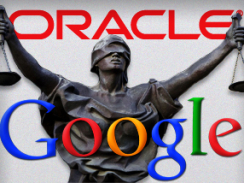Judge crushes Oracle's API copyright claims like a bug

Larry Ellison bought Sun in the hopes of winning intellectual property riches from its Java programming language. Those hopes have now been smashed. After having Oracle's Java patent claims against Google Android all but completely smashed, and a mere nine lines of code found to actually have been copied into Android from Java, Oracle's last hope was that U.S. District Court Judge William Alsup would rule that Java's application programming interfaces (API)s could be copyrighted. Instead Alsup has smashed Oracle's API claims as if they were cockroaches.
Oracle had sued Google over copyright infringement related to the use of 37 Java APIs used on the Android mobile operating system. Google argued they were free to use because Java both cause it was open source , and that, in case, APIs can't be copyrighted and that they're required to use any language.
The key point, as legal expert Pamela Jones of Groklaw pointed out was when Alsup ruled (PDF Link) that while “The overall name tree, of course, has creative elements but it is also a precise command structure — a utilitarian and functional set of symbols, each to carry out a pre-assigned function. This command structure is a system or method of operation under Section 102(b) of the Copyright Act and, therefore, cannot be copyrighted. Duplication of the command structure is necessary for interoperability.”
Alsup, unfortunately left the overall question of whether APIs can be copyrighted open. Alsup ruled:
So long as the specific code used to implement a method is different, anyone is free under the Copyright Act to write his or her own code to carry out exactly the same function or specification of any methods used in the Java API. It does not matter that the declaration or method header lines are identical.
Under the rules of Java, they must be identical to declare a method specifying the same functionality — even when the implementation is different. When there is only one way to express an idea or function, then everyone is free to do so and no one can monopolize that expression. And, while the Android method and class names could have been different from the names of their counterparts in Java and still have worked, copyright protection never extends to names or short phrases as a matter of law.
Therefore, “This order does not hold that Java API packages are free for all to use without license. It does not hold that the structure, sequence and organization of all computer programs may be stolen. Rather, it holds on the specific facts of this case, the particular elements replicated by Google were free for all to use under the Copyright Act.”
We can only hope that no one tries again to bring copyrights to APIs via the courts again. Still, even though Oracle's claims in this case were throughly smashed, it seems a sure thing that Oracle will appeal. Larry Ellison, Oracle's CEO, wouldn't be Larry Ellison if he gave up easily.
As Linus Torvalds, Linux’s creator, said over a week ago on Google+, “Prediction: instead of Oracle coming out and admitting they were morons about their idiotic suit against Android, they’ll come out posturing and talk about how they’ll be vindicated, and pay lawyers to take it to the next level of idiocy.” I have no doubt he's right.
That said, following in the footsteps of the European Union's European Court of Justice—the equivalent of the U.S. Supreme Court, which recently ruled that programming languages and APIs couldn't be copyrighted, Alsup has taken a small, but real, step in making sure that APIs can't be copyrighted in the U.S either.
Related Stories:
Judge hands another win to Google; rules 37 APIs not copyrightable
Behind the Headlines: the Inside Scoop on the Oracle vs Google Trial (Video)
Google kicks Oracle in its patent teeth
